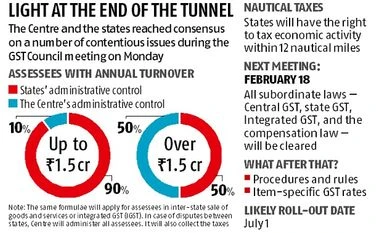The Goods and Services Tax (GST) Council on Monday broke a deadlock over issues of administrative control over assessees and broadly agreed to roll out the GST from July 1, instead of the earlier deadline of April 1.
Whether a state or the Centre will assess an entity would be decided by a computer programme. The Council also resolved a logjam over the right to tax economic activities within 12 nautical miles from India’s coasts.
Against the earlier proposals of reserving administration of assessees up to Rs 1.5 crore in annual turnover for states, or of allowing both the Centre and states to jointly administer these, the Council decided to blend the two suggestions. The entire tax base would be shared between the Centre and states in a predetermined ratio, Union Finance Minister Arun Jaitley, the chairman of the Council, said at a press conference after the meeting.
The Centre agreed the states would have the powers to administer 90 per cent of assessees with an annual turnover of up to Rs 1.5 crore. The Centre will have the powers to audit, send notices and scrutinise the remaining 10 per cent. Only West Bengal’s Amit Mitra did not agree, Jaitley said. Mitra later told reporters this agreement pertained to services only.
Assessees with a turnover over Rs 1.5 crore will be administratively controlled by the Centre and states in equal measure. However, Jaitley said no assessee would be controlled by two authorities and there would be computer-based enforcement at both the Centre and the states. Those assessees who fall under the integrated GST (IGST) — for the movement of goods and services between states — will also be administered by the Centre and states, depending on their annual turnover (Rs 1.5 crore, or more).
However, if there is a dispute between states over the place of supply, the Centre will have the power to administer those assessees. In all situations, the Centre will retain the power to collect this tax.
“Revenue will mostly come from entities with turnover of more than Rs 1.5 crore. Under that we get just three per cent revenue,” said a central government official. On whether or not assessees will change every year, he added, “Mostly, they will remain the same over a two- to three-year period. But, we are yet to take a call on that.” Mitra also opposed the power of arrest given to officials under the GST. The proposed structure has an arrest provision for tax evasion of Rs 2 crore and above. The offence is bailable up to Rs 5 crore. Mitra said, “Many of us strongly oppose it… Our officers do not have the right to arrest. It was, of course, watered down but is still there.”
The Centre also gave the right to tax economic activities within 12 nautical miles to coastal states, even as it will be the territory of the Union. At present, these states have the right to tax these activities.
The next meeting of the Council has been convened on February 18. By that time, changes to various Bills will be worked out and these will ready to be passed by Parliament and state Assemblies. Rules and segment-wise GST rates will take till March to finalise, pushing the introduction of the GST to July 1. Jaitley said the tax could be imposed at any time during the year, and trade and industry would get time to prepare for it. M S Mani of Deloitte Haskins & Sells LLP, said, “We hope the subsequent legislative processes are calendarised, so that the final legislation with relevant rules is available to businesses at least three months ahead of the roll-out.” According to Pratik Jain of PwC, uncertainty over the GST was now over and India Inc would be happy.
Unlock 30+ premium stories daily hand-picked by our editors, across devices on browser and app.
Pick your 5 favourite companies, get a daily email with all news updates on them.
Full access to our intuitive epaper - clip, save, share articles from any device; newspaper archives from 2006.
Preferential invites to Business Standard events.
Curated newsletters on markets, personal finance, policy & politics, start-ups, technology, and more.
)